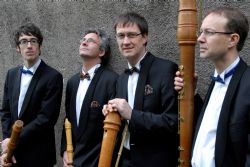|
Chamber
FRISSON DELIVERS SHIVERS OF DELIGHT
by Abby Wasserman
Sunday, March 30, 2025
Chamber
THE PARKER CAPTURES DEMANDING ADES QUARTET AT RAC SEBASTOPOL CONCERT
by Peter Lert
Saturday, February 15, 2025
Chamber
SPLENDID ECHOES ACROSS THE BAY
by Abby Wasserman
Sunday, February 9, 2025
ETHEREAL DUO IN WEILL HALL RECITAL
by Pamela Hicks Gailey
Thursday, February 6, 2025
ESPANA SEGURO AT SO CO PHIL'S JACKSON THEATER CONCERT
by Terry McNeill
Sunday, February 2, 2025
Choral and Vocal
MASTERFUL SINGING CLASS IN SCHROEDER HALL
by Pamela Hicks Gailey
Sunday, February 2, 2025
Recital
MUSICAL POT POURRI AT SPRING LAKE VILLAGE RECITAL
by Terry McNeill
Friday, January 31, 2025
CELLO AND CLARINET HIGHLIGHT TRIO NAVARRO'S CONCERT
by Ron Teplitz
Sunday, January 26, 2025
SONGS OF LOVE, IN A WARM TRIO
by Pamela Hicks Gailey
Sunday, January 26, 2025
Symphony
EARTHLY PLEASURES AT THE VALLEJO SYMPHONY
by Peter Lert
Sunday, January 19, 2025
|
 |
 Flanders Recorder Quartet |
VIRTUOSITY GALORE IN OCCIDENTAL RECORDER CONCERT
by Joanna Bramel Young
Saturday, February 27, 2010
The little white Community Church in Occidental was bursting at the seams with recorder enthusiasts and their friends February 27 when the Flanders Recorder Quartet came on stage in the fifth concert in the Redwood Arts Council’s series. The quartet, from Belgium, includes Bart Spanhove, Tom Beets, Joris Van Goethem and Paul Loey. Together for twenty years, the group is now considered the finest recorder quartet in the world, displacing the Amsterdam Loeki Stardust Quartet that enjoyed that honor for many years. The Leoki Stardust retired last year and the Flanders is happily with us.
The audience was treated to a program called “Symphonie des 7 Dégustations,” a banquet of recorder pieces of all kinds. Surrounding the four musicians on stage was a collection of twenty recorders of many sizes, from the tiny 10-inch sopranino to the seven foot six inch sub bass, all replicas of medieval, renaissance and baroque instruments.
The first piece, a “French aperitif,” was a Sonate en Quatour by the baroque composer Louis-Antoine Dornel (1684-1765). Two alto recorders covered the solo parts and tenor and contra bass fulfilled continuo parts. The graceful brilliance with which the ensemble played let the audience forget that they were listening to four recorders, with all four players demonstrating a complete mastery of their instruments. The recorder, compared to other early instruments, is the simplest in its construction, and is basically a whistle that has been refined to a very sophisticated level. This refinement existed in both renaissance and baroque instruments. Everything must be done with a lightness and delicacy of breath and fingers. The players make something look easy that is, in reality extremely difficult. The Flanders Quartet could just as well be playing violins, oboes or flutes, in terms of the elegance of the playing.
One of the pieces that this reviewer enjoyed most was a Bach transcription of a famous Vivaldi concerto (the “sorbet” course) where the four recorders gave the impression of a small orchestra. There was a great clarity in the parts, as each member carefully articulated the contrasting movements. Soaring slow movements contrasted with a great fugue, where each voice in turn took over the melody. A piece by Ralph Vaughan Williams, written in 1939, was scored for bamboo pipes – instruments that had some popularity in the 1930s. It was evocative of oriental music, with scales less familiar to the western ear. The gentle blowing technique used by all the players gave the music the sweet innocence of bamboo flutes. Recorders require extreme attention to intonation, as the slightest change of breath pressure changes the pitch of the note. The Flanders players have mastered the tuning problems inherent in recorders and it was a joy to hear the exquisite intonation throughout the evening.
In the second half of the concert the Flanders played pieces demonstrating the versatility of their ensemble, evoking pan pipes, a didgeridoo, percussion sounds, wind sounds, a brass band, and a calliope. Another piece was performed entirely on wine and beer bottles, tuned by adding the correct amount of water to each. Each player held two tuned bottles, and performed a charming work called “On the Bottle,” composed for them in 2002.
There was a bit of a “high wire act” feeling about the concert. The Flanders might have said, “See how fast we can play, and how many things we can do with these instruments.” This reviewer wished for more passion and less speed, but subsequent to talking to two of the members in a reception after the concert, I was impressed with the seriousness of their dedication to their work. Occidental was fortunate in being only one of four concerts the Quartet played on this tour. There were two concerts in the eastern USA, one in South Dakota, the one in Occidental, and then back to Belgium. Occidental had a stellar evening of specialized music for recorders, unique for a long time to come.
Reviewer's Note: In a post-concert conversation with one of the performers, I learned that he also plays renaissance double reed instruments. I asked him what he played, and he told me he plays a shawm (renaissance oboe) made by Robert Cronin. Coincidentally, Robert Cronin is a member of my ensemble, the Festival Consort, and, of course, all of our shawms were made by him.
|
